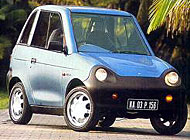Swiss engineer steers India’s first electric car on the road

With a Swiss engineer in the driver's seat, India's first electric car started rolling off the production lines last year.
“It’s a city car but it’s very well suited to Indian roads,” said Tillerten-born Paul Schweizer, a consultant for the Reva Electric Car Company in the southern city of Bangalore.
“The big advantage is that it is very small and easy to drive and very easy to manoeuvre through traffic,” he told swissinfo.
The Reva, which can carry two adults and two small children, costs about 250,000 rupees (SFr 8,500).
It is the cheapest car on Indian roads and also has the lowest operating costs – just 40 paise per kilometre. A comparable petrol car would cost 2.50 rupees per kilometre.
Similar cars expensive
Schweizer, who has built prototype electric vehicles in countries around the world, said India was the first place where it had been possible to produce such a car at reasonable cost.
“I’ve always worked in projects where the production costs were ultimately prohibitive and that was the main reason why none of these cars went into serious production.
“Here we are producing a small car – admittedly with limited range and limited speed – but it is the cheapest car to be sold in India. And the main advantage is that its running costs are very low because petrol in India is also quite expensive.”
The car has a top speed of 65 kilometres per hour and a range of about 80 kilometres before its batteries need to be recharged. An in-car system alerts the driver when batteries run low.
The car uses a power pack of eight lead acid batteries, which have a life span of three to four years or about 40,000 kilometres of driving. A replacement pack costs about 20,000 rupees (SFr700).
Plug it in
“It’s just like plugging your cell phone in for recharging,” explained Schweizer. “All you have to do is to plug your Reva into an ordinary 220 volt 15 amp electric socket every night.” Within three hours, it charges 80 per cent and in six hours it charges the full amount.
With no engine, no exhaust, no gears and no clutch, the Reva is silent and non-polluting, but Schweizer said it was hard to market the Reva’s “green” credentials because environmental consciousness was not high enough in India. Still, he hopes the car will appeal to urban commuters frustrated by the country’s crowded roads.
At present the car is only sold in Bangalore. A phased national launch is planned over the next year. The company plans to produce 1,500 cars in its first year of production, rising to 12,000 in three years.
Eventually, the company hopes to sell the car abroad, where its relatively inexpensive cost could offer a big advantage.
Breaking even
“We started selling in June and initially we have a capacity for about 20-30 cars a month,” said Schweizer. “Production till about March is sold right now but we have to produce about 100 vehicles a month to break even.”
Since the eighties, several Indian companies have tried to make battery-powered vehicles for road use but the projects have generally floundered for financial or manufacturing reasons.
The company’s chairman, Sudarshan Maini, has invested seven years and about 800 million rupees (SFr25 million) in the project’s development costs. The Reva is named after Maini’s wife.
About 95 per cent of the car’s 1,000 components are manufactured in India.
by Vincent Landon

In compliance with the JTI standards
More: SWI swissinfo.ch certified by the Journalism Trust Initiative
You can find an overview of ongoing debates with our journalists here . Please join us!
If you want to start a conversation about a topic raised in this article or want to report factual errors, email us at english@swissinfo.ch.